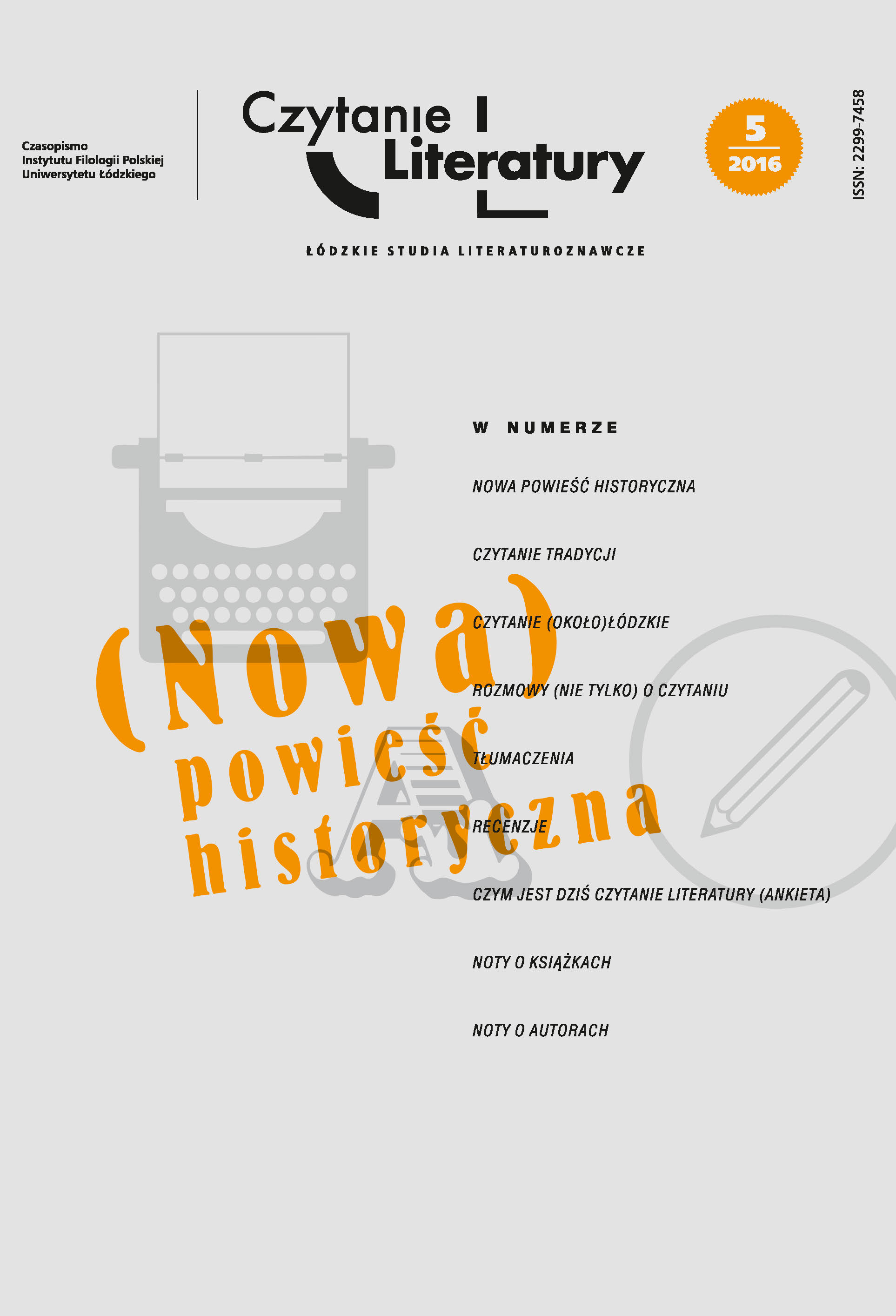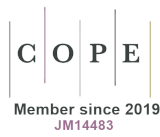Between ancient and bourgeois tragedy: the post-dramatic aesthetics by Heiner Müller
DOI:
https://doi.org/10.18778/2299-7458.05.17Keywords:
tragedy, bürgerliches Trauerspiel, East German literature, adaptation of mythsAbstract
The article focuses on the adaptations of ancient tragedies and mythological motifs in dramas by Heiner Müller – a renowned German dramatist, who is considered the successor of Brecht. Despite numerous problems with censorship, Müller never decided to leave the German Democratic Republic and emigrate abroad. Just like his other dramas, Müller’s adaptations can be read as politically involved writings which – through an elaborate argumentation – remonstrate the flaws of the Communist system. It is not, however, the reason why his works still remain topical. Their aesthetic allure lies in the proposal of a dialectical bond between two traditions of drama. On the examples of Müller’s three representative texts The Horatian, Philoctetes and Despoiled Shore Medea-material Landscape with Argonauts, the article presents the dramatist’s poetological strategy that combines tragedy with bürgerliches Trauerspiel – two mutually exclusive forms of German drama. The synthesis results in a significant political conclusion, which was obviously missed by the East German censors.
Downloads
References
Crăciun I., Die Politisierung des antiken Mythos in der deutschsprachigen Gegenwartsliteratur, Tübingen 2000.
Google Scholar
Domdey H., Produktivkraft Tod. Das Drama Heiner Müllers, Köln–Weimar– Wien 1998.
Google Scholar
Eke N.O., Furcht und Schrecken im Theater der Erinnerung oder „Man sollte Komödien schreiben / Leben in diesem trüben Menschenbrei“. Heiner Müllers Tragödie, [w:] Die deutsche Tragödie. Neue Lektüren einer Gattung im europäischen Kontext, red. V. C. Dörr, H. H. Schneider, Bielefeld 2006, s. 235–254.
Google Scholar
Eke N.O., Heiner Müller, Stuttgart 1999.
Google Scholar
Ethik und Ästhetik des Mitleids, red. I. von der Lühe, N. Gülcher, Freiburg i.B.– Berlin–Wien 2007.
Google Scholar
Ette W., Kritik der Tragödie. Über dramatische Entschleunigung, Weilerswist 2011.
Google Scholar
Georg S., Modell und Zitat: Mythos und Mythisches in der deutschsprachigen Literatur der 80er Jahre, Aachen 1996.
Google Scholar
Greiner B., Die Tragödie. Eine Literaturgeschichte des aufrechten Ganges, Stuttgart 2012.
Google Scholar
Gruber B., Mythen in den Dramen Heiner Müllers. Zu ihrem Funktionswandel in den Jahren 1958 bis 1982, Essen 1989.
Google Scholar
Hauschild J.Ch., Heiner Müller oder Das Prinzip Zweifel. Eine Biografie, Berlin 2001.
Google Scholar
Heiner Müller Handbuch. Leben-Werk-Wirkung, red. H.-Th. Lehmann, P. Primavesi, Stuttgart 2003.
Google Scholar
Hilzinger S., Kassandra: über Christa Wolf, Frankfurt a.M. 1982.
Google Scholar
Huller E.C., Griechisches Theater in Deutschland. Mythos und Tragödie bei Heiner Müller und Botho Strauß, Köln 2007.
Google Scholar
Jabłkowska J., „Antique” Dramas by Heiner Müller. Adaption of Myths or a new Dramatic, „Collectanea Philologica” 2014, nr 17, s. 137–148.
Google Scholar
Jentgens S., Kassandra. Spielarten einer literarischen Figur, Hildesheim 1995.
Google Scholar
Keim K., Theatralität in den späten Dramen Heiner Müllers, Tübingen 1998.
Google Scholar
Lehmann H.-Th., Teatr postdramatyczny, przeł. D. Sajewska, M. Sugiera, Kraków 2004.
Google Scholar
Lehmann H.-Th., Zwischen Monolog und Chor. Zur Dramaturgie Heiner Müllers, [w:] Heiner Müller: Probleme und Perspektiven. Bath Symposion 1998, red. I. Wallace, D. Tate, G. Labroisse, Amsterdam–Atlanta 2000, s. 11–26.
Google Scholar
Lefèvre E., Sophokles’ und Heiner Müllers ‚Philoktet‘, [w:] Skenika: Beiträge zum antiken Theater und seiner Rezeption. Festschrift zum 65. Geburtstag von Horst-Dieter Blume, red. S. Gödde, Darmstadt 200, s. 419–438.
Google Scholar
Lessing G.E., Mendelssohn M., Nicolai F., Briefwechsel über das Trauerspiel [1756/57], red. J. Schulte-Sasse, München 1972.
Google Scholar
Liwiusz Tytus, Dzieje od założenia miasta Rzymu, wyb., przeł. i oprac. W. Strzelecki, Wrocław 2004.
Google Scholar
Lüdde M.-E., Die Rezeption, Interpretation und Transformation biblischer Motive und Mythen in der DDR-Literatur und ihre Bedeutung für die Theologie, Berlin 1993.
Google Scholar
Müller H., Der Horatier, [w:] H. Müller, Werke 4, Stücke 2, Frankfurt a.M. 2001, s. 73–85.
Google Scholar
Müller H., Filoktet, „Literatura na Świecie”, 1976, nr 1, s. 75–107.
Google Scholar
Müller H., Gesammelte Irrtümer, Frankfurt a.M., 3 tomy, pierwsze wydania: 1986, 1991, 1994.
Google Scholar
Müller H., Gnijący brzeg, Materiały do Medei. Krajobraz z Argonautami, przeł. J.St. Buras, „Literatura na Świecie”, 1985, nr 4, s. 183–191.
Google Scholar
Müller H., Krieg ohne Schlacht. Leben in zwei Diktaturen, Köln 1992.
Google Scholar
Petersohn R., Heiner Müllers Shakespeare-Rezeption. Texte und Kontexte, Frankfurt a.M. i in. 1993.
Google Scholar
Sauerland K., Smutna prawda, „Literatura na Świecie” 1976, nr 1, s. 108–111.
Google Scholar
Schiller F., Über den Grund des Vergnügens an tragischen Gegenständen, [w:] tenże, Gesammelte Werke, t. 8: Philosophische Schriften, Berlin 1955, s. 164–177.
Google Scholar
Schings H.-J., Der mitleidigste Mensch ist der beste Mensch: Poetik des Mitleids von Lessing bis Büchner, München 1980.
Google Scholar
Schößler F., Einführung in das bürgerliche Trauerspiel und das soziale Drama, Darmstadt 2003.
Google Scholar
Schütte U., Heiner Müller, Köln–Weimar–Wien 2010.
Google Scholar
Schulz G., Heiner Müller, Stuttgart 1980.
Google Scholar
Sofokles, Tragedie, t. 1, przeł. i wstępem opatrzył R. R. Chodkowski, Lublin 2009.
Google Scholar
Szondi P., Die Theorie des bürgerlichen Trauerspiels im 18. Jahrhundert, Frankfurt a.M. 1973.
Google Scholar
Walerich-Szymani E., Godzina aktora. W poszukiwaniu utopii w dramaturgii Heiner Müllera, Kraków 2004.
Google Scholar
Downloads
Published
How to Cite
Issue
Section
License

This work is licensed under a Creative Commons Attribution-NonCommercial-NoDerivatives 4.0 International License.










